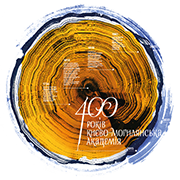News
Capacity Building of NaUKMA Lecturers at Maastricht University
- Details
- Published on Wednesday, 16 March 2016 15:36
Lecturers from Sc hool of Public Health, sociology, political studies and law departments participated in the training destined to enhance capacity of partner universities in Eastern European region to use active, interdisciplinary and blended modes of education, necessary for development of new educational opportunities in the field of health, innovations and society. The need for such educational opportunities is urgent against the background of healthcare systems transformations and attempts to find innovative solutions for persisting health problems in the Eastern European neighboring areas.
hool of Public Health, sociology, political studies and law departments participated in the training destined to enhance capacity of partner universities in Eastern European region to use active, interdisciplinary and blended modes of education, necessary for development of new educational opportunities in the field of health, innovations and society. The need for such educational opportunities is urgent against the background of healthcare systems transformations and attempts to find innovative solutions for persisting health problems in the Eastern European neighboring areas.
New approaches to teaching as well as bridging gaps between medical and social scientists were the core agenda of the training on student-oriented educational approaches. It was held on March 7 - 11, 2016 at Maastricht university (the Netherlands). Training was arranged in the framework of the ERASMUS+ capacity building project "Bridging Innovations, Health and Societies: Educational capacity building in the Eastern European Neighboring Areas", where National University of Kyiv-Mohyla Academy is an implementing university.
Maastricht University, known for its Problem-Based Learning model and integrated approaches to education and research, has extensive expertise in educational capacity building. During the training special attention was given to ways of translating active and blended learning methodologies into different socio-cultural contexts.
11 lecturers learnt the main principles and started practicing blended learning, problem based learning educational approach, as well as visited Science vision where video lectures for online learning are recorded, visit library university library which is one of the key university stakeholders.
The training was delivered by Nynke de Jong, Kasia Czabanowska, Mark Spigt, Willem de Grave, Anja Krumeich, and Milena Pavlova.
Most of the participants got the inspiration, new ideas and feedback on their teaching experience, so the course development work package within BIHSENA project is promising existing process for the lecturers with positive outcomes for students.
More information can be found here: https://bihsena.mumc.maastrichtuniversity.nl/
More information on innovative educational tricks and hints:
Constructive alignment: https://www.youtube.com/watch?v=iMZA80XpP6Y
Active learning: https://en.wikipedia.org/wiki/Active_learning
Problem-based learning (7 steps): http://www.maastrichtuniversity.nl/web/Faculties/PsychologyAndNeuroscience/TargetGroup/ProspectiveStudents/bachelorpsychology/BachelorsInPsychology/ProgrammeInformation/ProblemBasedLearning.htm
Dublin-descriptors (2004). Shared 'Dublin' Descriptors for Short Cycle, First Cycle, Second Cycle and Third Cycle Awards. Dublin, JQI Joint Quality Initiative informal group.
